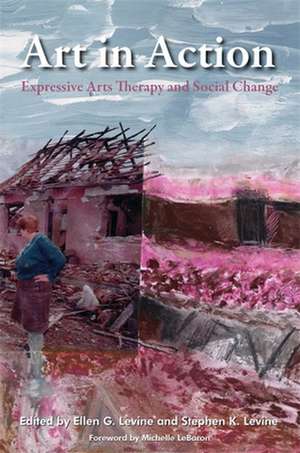Art in Action: Expressive Arts Therapy and Social Change: Arts Therapies
Michelle Lebaron Editat de Ellen G. Levine, Stephen K. Levineen Limba Engleză Paperback – 31 mar 2011
Din seria Arts Therapies
- 6%
 Preț: 175.44 lei
Preț: 175.44 lei - 6%
 Preț: 273.25 lei
Preț: 273.25 lei - 26%
 Preț: 214.21 lei
Preț: 214.21 lei - 26%
 Preț: 238.71 lei
Preț: 238.71 lei - 6%
 Preț: 225.65 lei
Preț: 225.65 lei - 6%
 Preț: 224.96 lei
Preț: 224.96 lei - 26%
 Preț: 226.62 lei
Preț: 226.62 lei - 25%
 Preț: 228.98 lei
Preț: 228.98 lei - 28%
 Preț: 154.57 lei
Preț: 154.57 lei - 24%
 Preț: 162.84 lei
Preț: 162.84 lei - 5%
 Preț: 338.82 lei
Preț: 338.82 lei - 23%
 Preț: 200.89 lei
Preț: 200.89 lei - 5%
 Preț: 224.44 lei
Preț: 224.44 lei - 27%
 Preț: 188.99 lei
Preț: 188.99 lei -
 Preț: 320.96 lei
Preț: 320.96 lei - 5%
 Preț: 275.35 lei
Preț: 275.35 lei -
 Preț: 297.18 lei
Preț: 297.18 lei - 5%
 Preț: 260.33 lei
Preț: 260.33 lei - 22%
 Preț: 169.10 lei
Preț: 169.10 lei
Preț: 225.93 lei
Preț vechi: 249.41 lei
-9% Nou
Puncte Express: 339
Preț estimativ în valută:
43.24€ • 44.97$ • 35.69£
43.24€ • 44.97$ • 35.69£
Carte disponibilă
Livrare economică 24 martie-07 aprilie
Preluare comenzi: 021 569.72.76
Specificații
ISBN-13: 9781849058209
ISBN-10: 1849058202
Pagini: 240
Ilustrații: Black and white photographs
Dimensiuni: 185 x 228 x 15 mm
Greutate: 0.36 kg
Editura: Jessica Kingsley Publishers Ltd
Seria Arts Therapies
ISBN-10: 1849058202
Pagini: 240
Ilustrații: Black and white photographs
Dimensiuni: 185 x 228 x 15 mm
Greutate: 0.36 kg
Editura: Jessica Kingsley Publishers Ltd
Seria Arts Therapies
Notă biografică
Ellen G. Levine is co-founder and faculty of ISIS Canada and a Senior Staff Social Worker at the Hincks-Dellcrest Centre for Children's Mental Health in Toronto, Canada. She is Core Faculty and Dean of Individualized Studies in Expressive Arts Therapy at the European Graduate School in Switzerland. Stephen K. Levine is Professor Emeritus of Social Science at York University in Toronto, Canada, Vice-Provost and Dean of the Doctoral Program in Expressive Arts: Therapy, Education, Consulting and Social Change at the European Graduate School in Switzerland, and Co-Director of ISIS Canada. Ellen and Stephen have authored and edited many books in the field of expressive arts therapy.
Cuprins
Foreword: Eureka! Discovering Gold in a Leaden World, Michelle LeBaron. Part I: Principles. 1. Art Opens to the World: Expressive Arts and Social Action, Stephen K. Levine. 2. From Social Change to Art Therapy and Back Again: A Memoir, Ellen Levine. 3. Social Activism within Expressive Arts "Therapy": What's in a Name? Karen Estrella. 4. Communal Art-making and Conflict Transformation, Paolo Knill. 5. From the Studio to the World: How Expressive Arts Therapy Can Help Further Social Change, Shaun McNiff. Part II: Issues. 6. A Social-Critical Reading of Indigenous Women's Art: The Use of Visual Data to 'Show,' rather than 'Tell,' of the Intersection of Different Layers of Oppression, Ephrat Huss. 7. Inside-out Outside-in: Found Objects and Portable Studio, Debra Kalmanowitz and Bobby Lloyd. 8. From Private Pain Toward Public Speech: Poetry Therapy with Iraqi Survivors of Torture and War, Shanee Stepakoff, Samer Hussein, Mariam Al-Salahat, Insherah Musa, Moath Asfoor, Eman Al-Houdali, and Maysa Al-Hmouz. Part III: Projects. 9. The Choreography of Absence: (In)habiting the Imagination After War, Carrie MacLeod. 10. Creating Space for Change: The Use of Expressive Arts with Vulnerable Children and Women Prisoners in Sub-Saharan Africa, Gloria Simoneaux. 11. Beauty in the Rough Places, Karen Abbs. 12. Art as a Gift: Expressive Arts in Bolivia, Sally Atkins. 13. A Black Dog on a Green Meadow: Doing Expressive Arts Therapy in Peru: Some Headlines, TAE Peru (Judith Alalu, Jose Miguel Calderon, Ximena Maurial, Monica Prado, Martin Zavala). 14. These Stories are Burning a Hole in my Brain: Using the Arts to Tell the Stories of the Ethiopian Jewish Immigrant Community in Israel, Vivien Marcow Speiser and Samuel Schwartz. Afterword: The Power of Poiesis, MaryBeth Morand.
